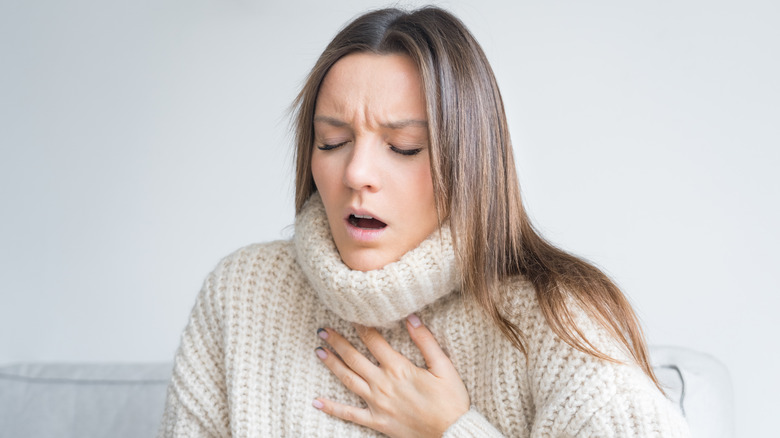You're Not Getting Enough Chloride If This Happens To You
Feeling tired and weak for no obvious reason? Do you have difficulty breathing? These symptoms can indicate an underlying condition, such as electrolyte imbalances or nutrient deficiencies. A possible cause could be hypochloremia, or low chloride levels, according to Healthline. Along with magnesium, sodium, potassium, and other electrolytes, chloride regulates your body's pH and fluid balance. Electrolytes also help transport nutrients to your cells and support the proper functioning of your nerves and muscles, per the U.S. National Library of Medicine. Therefore, even the slightest imbalance can take a toll on your health.
A typical normal range for chloride in adults is 98-106 milliequivalents per liter (mEq/L), per Healthline. Anything above or below this value could be a sign of an underlying problem, such as dehydration or congestive heart failure. Hypochloremia, or low chloride levels, may also be due to vomiting, diarrhea, kidney disease, and certain drugs, especially laxatives and diuretics, according to WebMD.
For example, athletes and gym-goers sweat a lot during exercise, which may cause dehydration and electrolyte imbalances. "We do not only lose fluids when we sweat — which can be replaced with beverages — but the levels of several electrolytes that are essential to fluid balance and neuromuscular functioning also decrease," researcher Beatriz Lara told Science Daily.
The question is, how can you tell your chloride levels are below normal? Most importantly, what's the best way to bring them back into balance? Let's find out.
How to recognize the signs of hypochloremia
Chloride is the second most abundant electrolyte in the bloodstream after sodium, according to a 2011 review published in the European Journal of Internal Medicine. As the scientists note, abnormal levels of this nutrient usually indicate an underlying metabolic disorder. The symptoms of hypochloremia are similar to those of hyponatremia, or low sodium levels, and may include nausea, weakness, fatigue, or headaches, according to the University of Hawaiʻi at Mānoa. Some people may also experience vomiting, diarrhea, or breathing problems, per Healthline.
However, most symptoms associated with low chloride levels are non-specific. For example, tiredness can also be due to bad sleep, prolonged stress, or poor nutrition. The only way to tell for sure is to get a chloride test. If your serum chloride levels are below 98 mEq/L, then you may need further investigations to determine the cause. After that, your doctor will decide on the best source of action, such as intravenous therapy or medications. Treatment will also depend on the severity of your symptoms.
Individuals with mild symptoms of hypochloremia may not require treatment, Healthline explains. If that's your case, you'll have to fill up on chloride-rich foods. Most people get this nutrient from table salt, but other foods — including olives, lettuce, and rye — contain chloride, too (via the U.S. National Library of Medicine). Depending on the cause of hypochloremia, you may also need to stop using corticosteroids, laxatives, or other medications that can lower blood chloride levels.


